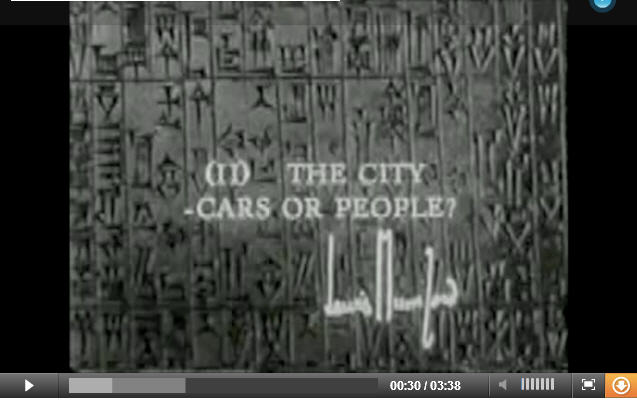This is not the first time anyone addressed these themes. In the City in History,  a classic text of urban design. Mumford urged in 1963 that technology achieves a balance with nature and hoped for a rediscovery of urban principles that emphasised humanity’s organic relationship to its environment. Forty-five years on, the film clips look incredibly old and the message delivered in a rather morbid and factious manner (to quote Jane Jacobs), with a slightly ‘Outer Limits’ or ‘Twilight Zone’ ambience. Yet some of the key ideas promoted by Mumford have increasing resonance with the sustainability and green agenda of the early 21st century. In the increasingly praxis orientated and commodified world of urban design, whether anyone is listening or not is another matter.
a classic text of urban design. Mumford urged in 1963 that technology achieves a balance with nature and hoped for a rediscovery of urban principles that emphasised humanity’s organic relationship to its environment. Forty-five years on, the film clips look incredibly old and the message delivered in a rather morbid and factious manner (to quote Jane Jacobs), with a slightly ‘Outer Limits’ or ‘Twilight Zone’ ambience. Yet some of the key ideas promoted by Mumford have increasing resonance with the sustainability and green agenda of the early 21st century. In the increasingly praxis orientated and commodified world of urban design, whether anyone is listening or not is another matter.
* Click here to access Louis Mumford on the city
Before the end of 1961 the New York publishing company Harcourt, Brace and Co. had the first edition of Lewis Mumford’s highly successful book The City In History ready for publication. Two years later, in 1963, the National Film Board of Canada funded the production of six documentaries, each lasting 27 minutes, for a series entitled Mumford On The City. The material for the films, based on the book, was prepared by Mumford himself. The director Ian MacNeill wrote the film script and produced the various parts: The City: Heaven and Hell, The City: Cars Or People, The City And Its Region, The Heart of the city, The City As Man’s Home and The City and the Future. In 1963 Mumford was 68 years old and agreed to appear as the presenter of the six films, expressing his personal view about the future of the western city, interspersed with pictures of places, cities, archaeological documents, works of art and architecture.
(The above taken from Willie Miller Urban Design + Planning posting at http://www.williemiller.co.uk/lewis-mumford-on-the-city.htm)
* Click here for rest of Miller Urban Design + Planning article.
# # #
Print this article




No comments:
Post a Comment
Thank you for your comment. You may wish to check back to the original entry from time to time to see if there are reactions to this. If you have questions, send an email to: editor@worldstreets.org